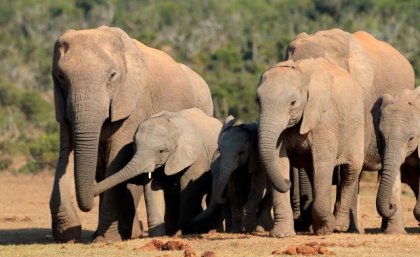
University of Queensland researchers have found African elephants use their acute sense of smell as a form of communication.
Professor Louw Hoffman from UQ’s Queensland Alliance of Agriculture and Food Innovation co-led a study of elephants in wildlife parks in Malawi, which found that smell was used to distinguish characteristics including age, health, reproductive status and family relationships between elephants.
“We tested the DNA, glands, urine and manure of 113 African elephants to identify family groupings,” Professor Hoffman said.
“We found a number of chemicals were common to group members, but others that were unique to each individual.
“Elephants never mate with a sibling, even if they’ve been separated for years and can tell a strange elephant is close by from the smell of their manure or other excretions.”
Professor Hoffman said social behaviour also suggests elephants use odour to monitor other pachyderms, both within and outside their herd.
“We observed elephants greeting each other by squealing and flapping their ears,” he said.
“We believe they’re pushing their pheromones towards the other elephant as a sign of recognition.
“When elephants charge each other flapping their ears, rather than making themselves look bigger, we believe they’re blowing their pheromones as a warning not to mess with them.”
Professor Hoffman said elephants not only identify different smells quickly, but also retain them in their memory.
“Some of the animals in the study were bred in captivity, and one of the tricks they’d been taught was to take a tourist’s hat and smell it,” he said.
“When the tourist came back hours later the elephant would be able to immediately identify who the hat belonged to.”
Professor Hoffman said elephants could be trained to sense many things, including blood and explosives.
“These findings show elephants are complex creatures, and sound is not their only form of communication,” he said.
“We see humans as the apex, but we now know elephants are one of many animals that have senses more finely attuned than ours.
“There is a lot we can learn from the elephant.”
The study was co-led by Dr Katharina von Dürckheim and Professor Alison Leslie from the University of Stellenbosch.
The research was published in Scientific Reports.
Media: Professor Louw Hoffman, louwrens.hoffman@uq.edu.au, +61 417 984 547; QAAFI Communications, Natalie MacGregor, n.macgregor@uq.edu.au, +61 409 135 651.
.jpg)










